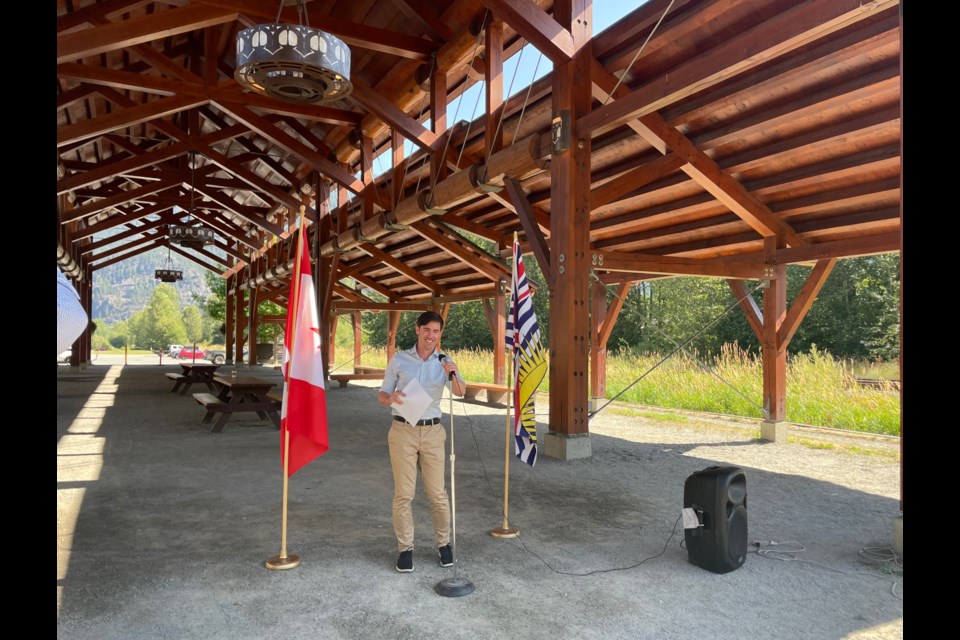The Lil’wat Nation and Village of Pemberton will receive improvements to their water infrastructure thanks to funding from the federal and provincial governments. Almost $10 million will be pumped into the area, which will contribute to the overall well-being and resilience of the communities and their local environments, according to officials.
The upgrades were announced at Pemberton’s Downtown Community Barn on Friday, July 19. Member of Parliament for the Sea to Sky, Patrick Weiler, Chief Dean Nelson of the Lil’wat Nation, and Pemberton Councillor Ted Craddock were on hand to share the news.
Pemberton will receive upgrades to its water infrastructure after a combined investment of more than $8.1 million from the federal and provincial governments, and the VOP. This project will construct a new water-treatment plant to provide efficient and reliable water treatment services. It will include an oxidation and filtration system to lower iron and manganese levels in the source water, and will increase the reliability of the community’s water supply while providing residents with access to high-quality drinking water.
Meanwhile, through a combined investment of more than $1.5 million from the federal government and Líl̓wat Nation, with support from the Government of B.C., rehabilitation and improvements are underway at Grandmother Slough, a fish-bearing stream within the Lillooet River floodplain.
The project involves removing invasive reed canary grass, upgrading four culverts at two major crossings, Main Street and Highway 99 East. This will help to improve water flow capacity, enhancing hydrometric monitoring, and restoring natural infrastructure to protect salmon habitat. The upgrades will safeguard infrastructure, preserve the environment, and mitigate the impacts on water quality and ecosystems during future flood events.
The federal government hopes to build resilient communities with projects like this, and in turn improve the lives of Canadians.
Weiler stressed the importance of everyone having safe and reliable drinking water at the July 19 announcement. He spoke on behalf of the Honourable Sean Fraser, Minister of Housing, Infrastructure and Communities
Both Pemberton and Lil’wat Nation currently have water restrictions in place. The Village of Pemberton (VOP) introduced “crucial” Level 3 water restrictions on Friday, July 12. The Lil’wat Nation previously introduced water restrictions of its own to “protect water infrastructure” and to “ensure there is adequate water storage available for firefighting.”
“Today's announcement of close to $10 million for two critical water projects will support residents across our region,” Weiler said. “In Pemberton, the construction of a new water treatment plant will ensure year-round access to clean and reliable water. Flood protection measures will safeguard homes, roads, and lands of the Líl̓wat Nation, while preserving salmon habitat. These investments will ensure clean, high-quality drinking water and protect residents and the environment for many years to come. The Government of Canada is committed to working with Indigenous peoples and all orders of government to deliver local infrastructure projects like these that help build more resilient communities for everyone."
Craddock spoke on behalf of mayor, council and the VOP, saying officials were thrilled to announce the significant investment in their community’s water infrastructure.
“The construction of a new Water Treatment Plant represents our dedication to the health and well-being of our community, ensuring residents continue to have access to safe, high-quality drinking water,” said Craddock. “As a growing community, it is essential that we stay ahead of future needs and plan responsibly. This project is a crucial next step in that direction, providing current and future residents with sustainable, safe, and reliable water resources. We extend our gratitude to the federal government and the Government of British Columbia for this generous support, which makes this vital project possible.”
Nelson said the project will greatly benefit Grandmother Slough.
“This project will help restore and strengthen an area of both historical and ecological importance to the Nation,” he said. ” Grandmother Slough has long been central to our community and its rehabilitation will greatly benefit our local ecosystem and environment.”




